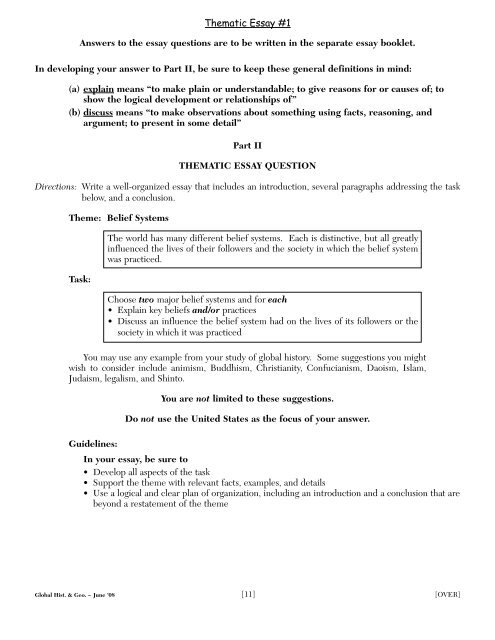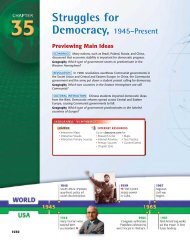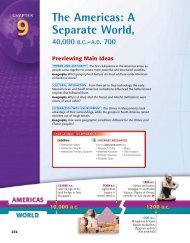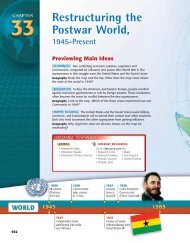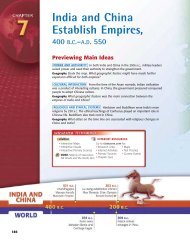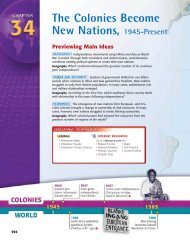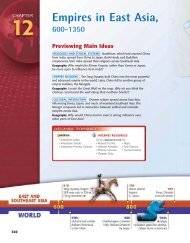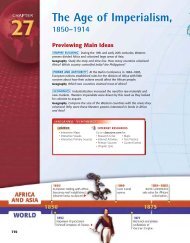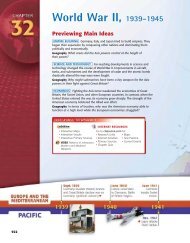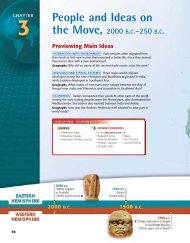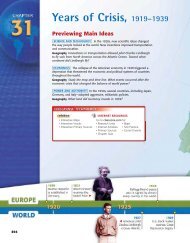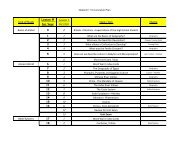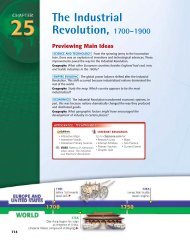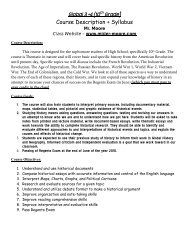Thematic Essay #1 - Mister Moore
Thematic Essay #1 - Mister Moore
Thematic Essay #1 - Mister Moore
Create successful ePaper yourself
Turn your PDF publications into a flip-book with our unique Google optimized e-Paper software.
In developing your answer to Part II, be sure to keep these general definitions in mind:<br />
(a) explain means “to make plain or understandable; to give reasons for or causes of; to<br />
show the logical development or relationships of”<br />
(b) discuss means “to make observations about something using facts, reasoning, and<br />
argument; to present in some detail”<br />
Part II<br />
THEMATIC ESSAY QUESTION<br />
Directions: Write a well-organized essay that includes an introduction, several paragraphs addressing the task<br />
below, and a conclusion.<br />
Theme: Belief Systems<br />
Task:<br />
The world has many different belief systems. Each is distinctive, but all greatly<br />
influenced the lives of their followers and the society in which the belief system<br />
was practiced.<br />
Choose two major belief systems and for each<br />
Explain key beliefs and/or practices<br />
Discuss an influence the belief system had on the lives of its followers or the<br />
society in which it was practiced<br />
You may use any example from your study of global history. Some suggestions you might<br />
wish to consider include animism, Buddhism, Christianity, Confucianism, Daoism, Islam,<br />
Judaism, legalism, and Shinto.<br />
Guidelines:<br />
<strong>Thematic</strong> <strong>Essay</strong> <strong>#1</strong><br />
Answers to the essay questions are to be written in the separate essay booklet.<br />
You are not limited to these suggestions.<br />
Do not use the United States as the focus of your answer.<br />
In your essay, be sure to<br />
Develop all aspects of the task<br />
Support the theme with relevant facts, examples, and details<br />
Use a logical and clear plan of organization, including an introduction and a conclusion that are<br />
beyond a restatement of the theme<br />
Global Hist. & Geo. – June ’08 [11] [OVER]
Answers to the essay questions are to be written in the separate essay booklet.<br />
In developing your answer to Part II, be sure to keep these general definitions in mind:<br />
(a) explain means “to make plain or understandable; to give reasons for or causes of; to<br />
show the logical development or relationships of”<br />
(b) discuss means “to make observations about something using facts, reasoning, and<br />
argument; to present in some detail”<br />
PART II<br />
THEMATIC ESSAY QUESTION<br />
Directions: Write a well-organized essay that includes an introduction, several paragraphs addressing the task<br />
below, and a conclusion.<br />
Theme: Change<br />
Task:<br />
The ideas and beliefs of philosophers and leaders have led to changes in<br />
nations and regions.<br />
Choose two philosophers and/or leaders and for each<br />
• Explain a major idea or belief of that philosopher or leader<br />
• Discuss how that idea or belief changed one nation or region<br />
You may use any philosophers or leaders from your study of global history. Some<br />
suggestions you might wish to consider include Confucius, John Locke, Adam Smith, Simón<br />
Bolívar, Otto von Bismarck, Vladimir Lenin, Mohandas Gandhi, Mao Zedong, Fidel Castro,<br />
or Nelson Mandela.<br />
You are not limited to these suggestions.<br />
Do not use a philosopher or leader from the United States in your answer.<br />
Guidelines:<br />
<strong>Thematic</strong> <strong>Essay</strong> #2<br />
In your essay, be sure to<br />
• Develop all aspects of the task<br />
• Support the theme with relevant facts, examples, and details<br />
• Use a logical and clear plan of organization, including an introduction and a conclusion<br />
that are beyond a restatement of the theme<br />
Global Hist. & Geo. – Jan. ’06 [11] [OVER]
Write the answer to the essay question on the lined sheets in this booklet.<br />
In developing your answer to Part II, be sure to keep these general definitions in mind:<br />
(a) describe means “to illustrate something in words or tell about it”<br />
(b) discuss means “to make observations about something using facts, reasoning, and<br />
argument; to present in some detail”<br />
PART II<br />
THEMATIC ESSAY QUESTION<br />
Directions: Write a well-organized essay that includes an introduction, several paragraphs addressing the task<br />
below, and a conclusion.<br />
Theme: Change<br />
Task:<br />
Throughout history, the actions of leaders have changed the society in<br />
which they lived.<br />
Identify two leaders who changed the society in which they lived and for<br />
each<br />
• Describe one situation the leader attempted to change<br />
• Describe one action the leader took to change this situation<br />
• Discuss the impact of that action on the society in which the leader<br />
lived<br />
You may use any leader from your study of global history and geography except<br />
Johann Gutenberg and James Watt. Some suggestions you might wish to consider include<br />
Martin Luther, Queen Elizabeth I, Toussaint L’Ouverture, Napoleon Bonaparte,<br />
Simón Bolívar, Otto von Bismarck, Mohandas Gandhi, Mao Zedong, Ho Chi Minh,<br />
Fidel Castro, and Nelson Mandela.<br />
Guidelines:<br />
<strong>Thematic</strong> <strong>Essay</strong> #3<br />
You are not limited to these suggestions.<br />
Do not use a leader from the United States in your answer.<br />
In your essay, be sure to<br />
• Develop all aspects of the task<br />
• Support the theme with relevant facts, examples, and details<br />
• Use a logical and clear plan of organization, including an introduction and a conclusion<br />
that are beyond a restatement of the theme<br />
Global Hist. & Geo. – Aug. ’05 [11] [OVER]
Answers to the essay questions are to be written in the separate essay booklet.<br />
In developing your answer to Part II, be sure to keep these general definitions in mind:<br />
(a) explain means “to make plain or understandable; to give reasons for or causes of; to<br />
show the logical development or relationships of ”<br />
(b) discuss means “to make observations about something using facts, reasoning, and<br />
argument; to present in some detail”<br />
Part II<br />
THEMATIC ESSAY QUESTION<br />
Directions: Write a well-organized essay that includes an introduction, several paragraphs addressing the task<br />
below, and a conclusion.<br />
Theme: Change [Individuals Who Have Changed History]<br />
Task:<br />
The beliefs and achievements of individuals have changed global history.<br />
These beliefs and achievements have had positive and negative effects on<br />
society.<br />
Identify two individuals who have changed global history and for each:<br />
• Explain one belief or achievement of that individual<br />
• Discuss the positive and/or negative effects of the individual’s belief or<br />
achievement<br />
You may use any individual from your study of global history except Nicholas<br />
Copernicus, Sir Isaac Newton, and Norman Borlaug. The individuals you identify must<br />
have had a major role in shaping global history and must not be from the United States.<br />
Some individuals that you might consider include Hammurabi, Confucius, Aristotle,<br />
Alexander the Great, Muhammad, Johannes Gutenberg, Queen Isabella, Leonardo da Vinci,<br />
John Locke, Catherine the Great, Simón Bolívar, or Nelson Mandela.<br />
Guidelines:<br />
<strong>Thematic</strong> <strong>Essay</strong> #4<br />
You are not limited to these suggestions.<br />
In your essay, be sure to<br />
• Address all aspects of the Task<br />
• Support the theme with relevant facts, examples, and details<br />
• Use a logical and clear plan of organization<br />
• Include an introduction and a conclusion that are beyond a simple restatement of the<br />
Theme<br />
Global Hist. & Geo. –Jan. ’04 [10]
Answers to the essay questions are to be written in the separate essay booklet.<br />
In developing your answer to Part II, be sure to keep these general definitions in mind:<br />
(a) describe means “to illustrate something in words or tell about it”<br />
(b) discuss means “to make observations about something using facts, reasoning, and<br />
argument; to present in some detail”<br />
Part II<br />
THEMATIC ESSAY QUESTION<br />
Directions: Write a well-organized essay that includes an introduction, several paragraphs addressing the task<br />
below, and a conclusion.<br />
Theme: Change<br />
Task:<br />
Not all revolutions are political. Nonpolitical revolutions have brought important<br />
intellectual, economic, and/or social changes to societies.<br />
Identify two nonpolitical revolutions that brought important intellectual,<br />
economic, and/or social changes to societies and for each<br />
Describe one change brought about by this nonpolitical revolution<br />
Discuss an impact this nonpolitical revolution had on a specific society or<br />
societies<br />
You may use any nonpolitical revolution that brought important intellectual, economic,<br />
and/or social changes from your study of global history. Some suggestions you might wish to<br />
consider include the Neolithic Revolution (10,000–6,000 B.C.), the Commercial Revolution<br />
(11th–18th centuries), the Scientific Revolution (16th–18th centuries), the Enlightenment<br />
(17th–18th centuries), the Agricultural Revolution (18th–19th centuries), the Industrial<br />
Revolution in Europe (18th–19th centuries), and the Green Revolution (late 20th century).<br />
You are not limited to these suggestions. However, do not choose a political revolution<br />
as one of your two revolutions.<br />
Guidelines:<br />
<strong>Thematic</strong> <strong>Essay</strong> #5<br />
In your essay, be sure to<br />
Develop all aspects of the task<br />
Support the theme with relevant facts, examples, and details<br />
Use a logical and clear plan of organization, including an introduction and a conclusion<br />
that are beyond a restatement of the theme<br />
Global Hist. & Geo. – Jan. ’08 [11] [OVER]
Answers to the essay questions are to be written in the separate essay booklet.<br />
In developing your answers to Parts II and III, be sure to keep these general definitions in mind:<br />
(a) explain means “to make plain or understandable; to give reasons for or causes of; to show<br />
the logical development or relationships of”<br />
(b) describe means “to illustrate something in words or tell about it”<br />
(c) evaluate means “to examine and judge the significance, worth, or condition of; to determine<br />
the value of”<br />
(d) compare and contrast means “to express similarities and differences”<br />
Part II<br />
THEMATIC ESSAY QUESTION<br />
Directions: Write a well-organized essay that includes an introduction, several paragraphs addressing the task<br />
below, and a conclusion.<br />
Theme: Change<br />
Task:<br />
Throughout history, political revolutions had many causes. These revolutions<br />
affected society and led to many changes. The changes may or may not have<br />
resolved the problems that caused the revolutions.<br />
Choose one political revolution from your study of global history and<br />
geography and:<br />
• Explain the causes of the revolution<br />
• Describe the effects this political revolution had on society<br />
• Evaluate whether the changes that resulted from the political revolution<br />
resolved the problems that caused it<br />
You may use any example from your study of global history, but do not use the American<br />
Revolution. Some suggestions you might wish to consider include the French Revolution<br />
(1789), Mexican Revolution (1910), Russian Revolution (1917), Chinese Revolution (1949),<br />
Cuban Revolution (1959), or Iranian Revolution (1979).<br />
Guidelines:<br />
<strong>Thematic</strong> <strong>Essay</strong> #6<br />
You are not limited to these suggestions.<br />
In your essay, be sure to:<br />
• Address all aspects of the Task<br />
• Support the theme with relevant facts, examples, and details<br />
• Use a logical and clear plan of organization<br />
• Introduce the theme by establishing a framework that is beyond a simple<br />
restatement of the Task and conclude with a summation of the theme<br />
Global Hist. & Geo. –Jan. ’03 [11] [OVER]
Answers to the essay questions are to be written in the separate essay booklet.<br />
In developing your answers to Parts II and III, be sure to keep these general definitions in mind:<br />
(a) discuss means “to make observations about something using facts, reasoning, and argument;<br />
to present in some detail”<br />
(b) evaluate means to “examine and judge the significance, worth, or condition of; to determine<br />
the value of”<br />
Part II<br />
THEMATIC ESSAY QUESTION<br />
Directions: Write a well-organized essay that includes an introduction, several paragraphs addressing the task<br />
below, and a conclusion.<br />
Theme: Change<br />
Task:<br />
Individuals have brought about great changes in history. These individuals<br />
have had positive and/or negative effects on nations or regions.<br />
Choose two individuals from your study of global history and geography and<br />
for each individual chosen:<br />
•Discuss two specific changes made by the individual in a specific nation<br />
or region<br />
• Evaluate whether these changes have had a positive or a negative effect<br />
on that nation or region<br />
You may use any example from your study of global history and geography. Some suggestions<br />
you might wish to consider include Elizabeth I, Genghis Khan, Muhammed, Martin<br />
Luther, Napoleon Bonaparte, Toussaint L’Ouverture, Nelson Mandela, Fidel Castro, Boris<br />
Yeltsin, Deng Xiaoping, and Yasir Arafat.<br />
Guidelines:<br />
<strong>Thematic</strong> <strong>Essay</strong> #7<br />
You are not limited to these suggestions.<br />
Do not use an individual from the United States in your answer.<br />
In your essay, be sure to:<br />
• Address all aspects of the Task<br />
• Support the theme with relevant facts, examples, and details<br />
• Use a logical and clear plan of organization<br />
• Introduce the theme by establishing a framework that is beyond a simple<br />
restatement of the Task and conclude with a summation of the theme<br />
Global Hist. & Geo. –Aug. ’02 [11] [OVER]
Answers to the essay questions are to be written in the separate essay booklet.<br />
In developing your answers to Parts II and III, be sure to keep these general definitions in mind:<br />
(a) describe means “to illustrate something in words or tell about it”<br />
(b) explain means “to make plain or understandable; to give reasons for or causes of; to show<br />
the logical development or relationships of”<br />
(c) compare and contrast means “to express similarities and differences”<br />
(d) discuss means “to make observations about something using facts, reasoning, and argument;<br />
to present in some detail”<br />
Part II<br />
THEMATIC ESSAY QUESTION<br />
Directions: Write a well-organized essay that includes an introduction, several paragraphs addressing the task<br />
below, and a conclusion.<br />
Theme: Change — Turning Points<br />
Task:<br />
<strong>Thematic</strong> <strong>Essay</strong> #8<br />
Political, economic, and social conditions have often led to turning points<br />
that have changed the course of history for nations and peoples.<br />
Identify two turning points from your study of global history and for each:<br />
• Describe the causes and key events that led to the turning point<br />
• Explain how each turning point changed the course of history for<br />
nations and peoples<br />
You may use any turning point from your study of global history. Do not use the United<br />
States in your answer. Some suggestions you might wish to consider include: Neolithic<br />
Revolution, the fall of the Roman Empire, Commercial Revolution, the year 1492, French<br />
Revolution, the year 1914, Chinese Communist Revolution, the collapse of European<br />
imperialism, the fall of the Berlin Wall/collapse of Soviet Union.<br />
You are not limited to these suggestions.<br />
Global Hist. & Geo. –Aug. ’01 [10]
Answers to the essay questions are to be written in the separate essay booklet.<br />
In developing your answer to Part II, be sure to keep this general definition in mind:<br />
discuss means “to make observations about something using facts, reasoning, and<br />
argument; to present in some detail”<br />
PART II<br />
THEMATIC ESSAY QUESTION<br />
Directions: Write a well-organized essay that includes an introduction, several paragraphs addressing the task<br />
below, and a conclusion.<br />
Theme: Conflict<br />
Task:<br />
Conflicts between groups of people have threatened peace in many<br />
nations and regions.<br />
Identify one conflict that has threatened peace in a nation or region and<br />
• Discuss one major cause of that conflict<br />
• Identify two opposing groups involved in the conflict and discuss one<br />
viewpoint of each group<br />
• Discuss the extent to which the conflict was or was not resolved<br />
You may use any major conflict from your study of global history. Some suggestions you<br />
might wish to consider include the Crusades, the French Revolution, World War I, the<br />
Russian Revolution, the Chinese civil war, the partition of India, the policy of apartheid in<br />
South Africa, the Rwandan civil war, and the Bosnian War.<br />
Guidelines:<br />
<strong>Thematic</strong> <strong>Essay</strong> #9<br />
You are not limited to these suggestions.<br />
Do not use conflicts that occurred in the United States in your answer.<br />
In your essay, be sure to<br />
• Develop all aspects of the task<br />
• Support the theme with relevant facts, examples, and details<br />
• Use a logical and clear plan of organization, including an introduction and a conclusion that<br />
are beyond a restatement of the theme<br />
Global Hist. & Geo. – June ’06 [12]
Answers to the essay questions are to be written in the separate essay booklet.<br />
In developing your answer to Part II, be sure to keep these general definitions in mind:<br />
(a) discuss means “to make observations about something using facts, reasoning, and<br />
argument; to present in some detail”<br />
(b) analyze means “to determine the nature and relationship of the component elements”<br />
Part II<br />
THEMATIC ESSAY QUESTION<br />
Directions: Write a well-organized essay that includes an introduction, several paragraphs addressing the task<br />
below, and a conclusion.<br />
Theme: Conflict<br />
Task:<br />
Differences among groups have often led to conflict.<br />
Identify two ethnic, religious, political, and/or cultural conflicts and for each:<br />
• Discuss the historical circumstances that led to the conflict<br />
• Analyze the effect of this conflict on two groups involved<br />
You may use any examples from your study of global history and geography. Some<br />
suggestions you might wish to consider include the persecution of Christians during the<br />
Roman Empire, the Reign of Terror, the Armenian massacres, the forced famine in Ukraine,<br />
the Holocaust, Apartheid in South Africa, the Killing Fields of Cambodia, the conflict in<br />
Northern Ireland, the Sandinistas in Nicaragua, and the Tiananmen Square rebellion.<br />
Guidelines:<br />
<strong>Thematic</strong> <strong>Essay</strong> <strong>#1</strong>0<br />
You are not limited to these suggestions.<br />
Do not use any conflict that occurred in the United States.<br />
In your essay, be sure to:<br />
• Address all aspects of the Task<br />
• Support the theme with relevant facts, examples, and details<br />
• Use a logical and clear plan of organization<br />
• Introduce the theme by establishing a framework that is beyond a simple<br />
restatement of the Task and conclude with a summation of the theme<br />
Global Hist. & Geo. –June ’03 [11] [OVER]
Answers to the essay questions are to be written in the separate essay booklet.<br />
In developing your answers to Parts II and III, be sure to keep these general definitions in mind:<br />
(a) discuss means “to make observations about something using facts, reasoning, and argument;<br />
to present in some detail”<br />
(b) compare and contrast means “to discuss similarities and differences”<br />
(c) evaluate means “to examine and judge the significance, worth, or condition of; to<br />
determine the value of”<br />
PART II<br />
THEMATIC ESSAY QUESTION<br />
Directions: Write a well-organized essay that includes an introduction, several paragraphs addressing the task<br />
below, and a conclusion.<br />
Theme: Economic Change<br />
Task:<br />
<strong>Thematic</strong> <strong>Essay</strong> <strong>#1</strong>1<br />
Since the 19th century, industrialization has had positive and negative<br />
effects on the lives of workers.<br />
• Define the term “industrialization”<br />
• Select one nation you have studied and discuss two specific examples<br />
of the ways in which industrialization changed the lives of workers in<br />
that nation<br />
• Discuss the response of the workers, reformers, and/or government to<br />
these changes<br />
You may use any nation from your study of global history except the United States. Some<br />
suggestions you might wish to consider include: Great Britain (19th century), Japan (19th or<br />
20th century), Russia (19th or 20th century), Korea (post–World War II), and Brazil (20th<br />
century).<br />
You are not limited to these suggestions.<br />
NOTE: The rubric (scoring criteria) for this essay appears on the next page.<br />
Global Hist. & Geo. –Jan. ’01 [11] [OVER]
<strong>Thematic</strong> <strong>Essay</strong> <strong>#1</strong>2<br />
THEMATIC ESSAY<br />
GENERIC SCORING RUBRIC<br />
Score of 5:<br />
• Shows a thorough understanding of the theme or problem<br />
• Addresses all aspects of the task<br />
• Shows an ability to analyze, evaluate, compare and/or contrast issues and events<br />
• Richly supports the theme or problem with relevant facts, examples, and details<br />
• Is a well-developed essay, consistently demonstrating a logical and clear plan of organization<br />
• Introduces the theme or problem by establishing a framework that is beyond a simple restatement of the task<br />
and concludes with a summation of the theme or problem<br />
Score of 4:<br />
• Shows a good understanding of the theme or problem<br />
• Addresses all aspects of the task<br />
• Shows an ability to analyze, evaluate, compare and/or contrast issues and events<br />
• Includes relevant facts, examples, and details, but may not support all aspects of the theme or problem evenly<br />
• Is a well-developed essay, demonstrating a logical and clear plan of organization<br />
• Introduces the theme or problem by establishing a framework that is beyond a simple restatement of the task<br />
and concludes with a summation of the theme or problem<br />
Score of 3:<br />
• Shows a satisfactory understanding of the theme or problem<br />
• Addresses most aspects of the task or addresses all aspects in a limited way<br />
• Shows an ability to analyze or evaluate issues and events, but not in any depth<br />
• Includes some facts, examples, and details<br />
• Is a satisfactorily developed essay, demonstrating a general plan of organization<br />
• Introduces the theme or problem by repeating the task and concludes by repeating the theme or problem<br />
Score of 2:<br />
• Shows limited understanding of the theme or problem<br />
• Attempts to address the task<br />
• Develops a faulty analysis or evaluation of issues and events<br />
• Includes few facts, examples, and details, and may include information that contains inaccuracies<br />
• Is a poorly organized essay, lacking focus<br />
• Fails to introduce or summarize the theme or problem<br />
Score of 1:<br />
• Shows very limited understanding of the theme or problem<br />
• Lacks an analysis or evaluation of the issues and events<br />
• Includes little or no accurate or relevant facts, examples, or details<br />
• Attempts to complete the task, but demonstrates a major weakness in organization<br />
• Fails to introduce or summarize the theme or problem<br />
Score of 0: Fails to address the task, is illegible, or is a blank paper<br />
Global Hist. & Geo. –Jan. ’01 [12]
Answers to the essay questions are to be written in the separate essay booklet.<br />
In developing your answer to Part II, be sure to keep these general definitions in mind:<br />
(a) discuss means “to make observations about something using facts, reasoning, and<br />
argument; to present in some detail”<br />
(b) describe means “to illustrate something in words or tell about it”<br />
(c) evaluate means “to examine and judge the significance, worth, or condition of; to<br />
determine the value of”<br />
Part II<br />
THEMATIC ESSAY QUESTION<br />
Directions: Write a well-organized essay that includes an introduction, several paragraphs addressing the task<br />
below, and a conclusion.<br />
Theme: Economic Systems<br />
Task:<br />
Societies have developed different economic systems for many reasons.<br />
Some of these economic systems include manorialism, capitalism, and<br />
communism.<br />
Identify one society and one economic system that has been used or is<br />
being used in that society and<br />
• Discuss the historical circumstances surrounding the development of<br />
that economic system<br />
• Describe two features of the economic system<br />
• Evaluate the impact the economic system had on this society during a<br />
specific historical period<br />
You may use any society from your study of global history. Some suggestions you might<br />
wish to consider include western Europe during the Middle Ages, western Europe during the<br />
Industrial Revolution, the Soviet Union between 1917 and 1990, Japan after World War II,<br />
China since 1949, and Cuba since 1959.<br />
You are not limited to these suggestions.<br />
Do not use the United States as the example of a society in your answer.<br />
Guidelines:<br />
<strong>Thematic</strong> <strong>Essay</strong> <strong>#1</strong>3<br />
In your essay, be sure to:<br />
• Develop all aspects of the task<br />
• Support the theme with relevant facts, examples, and details<br />
• Use a logical and clear plan of organization, including an introduction and a conclusion<br />
that are beyond a restatement of the theme<br />
Global Hist. & Geo. – Aug. ’04 [13] [OVER]
In developing your answer to Part II, be sure to keep these general definitions in mind:<br />
(a) explain means “to make plain or understandable; to give reasons for or causes of; to show<br />
the logical development or relationship of”<br />
(b) discuss means “to make observations about something using facts, reasoning, and<br />
argument; to present in some detail”<br />
Part II<br />
THEMATIC ESSAY QUESTION<br />
Directions: Write a well-organized essay that includes an introduction, several paragraphs addressing the task<br />
below, and a conclusion.<br />
Theme: Geography (How Humans Change Their Environment)<br />
Task:<br />
Throughout global history, human societies in various nations and regions have<br />
changed their physical environments to meet their needs. Societies have built<br />
structures, removed vegetation and resources, and modified the land to meet<br />
their needs. These changes have often had different results.<br />
Select two different nations/regions and for each<br />
Explain why the society modified their environment<br />
Explain how the people of that specific nation/region modified their physical<br />
environment<br />
Discuss the effect this modification had on that nation/region<br />
You may use any nation or region from your study of global history. Some suggestions you<br />
might wish to consider include Middle East (modified the land), Africa (modified the land),<br />
Japan (modified the land), Great Britain (removed resources), South Africa (removed<br />
resources), Brazil (removed vegetation), China (built a structure), and East Germany (built<br />
structures).<br />
You are not limited to these suggestions.<br />
Do not select the United States or a region of the United States as an example in your answer.<br />
Guidelines:<br />
<strong>Thematic</strong> <strong>Essay</strong> <strong>#1</strong>4<br />
Answers to the essay questions are to be written in the separate essay booklet.<br />
In your essay, be sure to<br />
Develop all aspects of the task<br />
Support the theme with relevant facts, examples, and details<br />
Use a logical and clear plan of organization, including an introduction and a conclusion<br />
that are beyond a restatement of the theme<br />
Global Hist. & Geo.–Aug. ’08 [10]
Answers to the following questions are to be written in the separate essay booklet.<br />
In developing your answers to Parts II and III, be sure to keep these general definitions in mind:<br />
(a) explain means “to make plain or understandable; to give reasons for or causes of; to show the<br />
logical development or relationships of ”<br />
(b) discuss means “to make observations about something using facts, reasoning, and argument;<br />
to present in some detail”<br />
(c) describe means “to illustrate something in words or tell about it”<br />
(d) evaluate means “to examine and judge the significance, worth, or condition of; to determine<br />
the value of”<br />
Part II<br />
THEMATIC ESSAY QUESTION<br />
Directions: Write a well-organized essay that includes an introduction, several paragraphs addressing the task<br />
below, and a conclusion.<br />
Theme: Geography<br />
Task:<br />
Geographic factors have influenced historical developments and historical<br />
events of nations and regions.<br />
Choose two nations and/or regions and for each:<br />
• Identify and describe two geographic factors in each nation and/or region<br />
• Explain how each factor has influenced the historical development or a<br />
specific historical event in each nation and/or region<br />
You may use any nation and/or region and any geographic factors from your study of<br />
global history and geography. Do not use the United States in your answer. Some factors<br />
you might wish to consider include deserts, river valleys, or oil in the Middle East; river valleys,<br />
monsoons, or the Himalaya Mountains in India; natural resources or the island location<br />
of Japan or Great Britain; the river valley or the desert in Egypt; the regular coastline or<br />
resources in South Africa; the Amazon rain forest or the Andes Mountains in South America.<br />
Guidelines:<br />
<strong>Thematic</strong> <strong>Essay</strong> <strong>#1</strong>5<br />
You are not limited to these suggestions.<br />
In your essay, be sure to:<br />
• Address all aspects of the Task<br />
• Support the theme with relevant facts, examples, and details<br />
• Use a logical and clear plan of organization<br />
• Introduce the theme by establishing a framework that is beyond a simple<br />
restatement of the Task and conclude with a summation of the theme<br />
Global Hist. & Geo. –Jan. ’02 [11] [OVER]
Answers to the essay questions are to be written in the separate essay booklet.<br />
In developing your answers to Parts II and III, be sure to keep these general definitions in mind:<br />
(a) discuss means “to make observations about something using facts, reasoning, and argument;<br />
to present in some detail”<br />
(b) explain means “to make plain or understandable; to give reasons for or causes of; to<br />
show the logical development or relationships of”<br />
PART II<br />
THEMATIC ESSAY QUESTION<br />
Directions: Write a well-organized essay that includes an introduction, several paragraphs addressing the task<br />
below, and a conclusion.<br />
Theme: Geography<br />
Task:<br />
<strong>Thematic</strong> <strong>Essay</strong> <strong>#1</strong>6<br />
Geographic features can positively or negatively affect the development<br />
of a nation or a region.<br />
Select one geographic feature from your study of global history.<br />
• Explain how this geographic feature has had an effect on the historical<br />
development of two nations or regions<br />
Be sure to include specific historical examples in your essay.<br />
You may use any geographic feature from your study of global history. Some suggestions<br />
you might wish to consider include: river valley, mountain, desert, island, rain forest, and climate.<br />
Do not use the United States in your answer.<br />
You are not limited to these suggestions.<br />
NOTE: The rubric (scoring criteria) for this essay appears on the next page.<br />
Global Hist. & Geo. –June ’01 [11] [OVER]
<strong>Thematic</strong> <strong>Essay</strong> <strong>#1</strong>7<br />
THEMATIC ESSAY<br />
GENERIC SCORING RUBRIC<br />
Score of 5:<br />
• Shows a thorough understanding of the theme or problem<br />
• Addresses all aspects of the task<br />
• Shows an ability to analyze, evaluate, compare and/or contrast issues and events<br />
• Richly supports the theme or problem with relevant facts, examples, and details<br />
• Is a well-developed essay, consistently demonstrating a logical and clear plan of organization<br />
• Introduces the theme or problem by establishing a framework that is beyond a simple restatement of the task<br />
and concludes with a summation of the theme or problem<br />
Score of 4:<br />
• Shows a good understanding of the theme or problem<br />
• Addresses all aspects of the task<br />
• Shows an ability to analyze, evaluate, compare and/or contrast issues and events<br />
• Includes relevant facts, examples, and details, but may not support all aspects of the theme or problem evenly<br />
• Is a well-developed essay, demonstrating a logical and clear plan of organization<br />
• Introduces the theme or problem by establishing a framework that is beyond a simple restatement of the task<br />
and concludes with a summation of the theme or problem<br />
Score of 3:<br />
• Shows a satisfactory understanding of the theme or problem<br />
• Addresses most aspects of the task or addresses all aspects in a limited way<br />
• Shows an ability to analyze or evaluate issues and events, but not in any depth<br />
• Includes some facts, examples, and details<br />
• Is a satisfactorily developed essay, demonstrating a general plan of organization<br />
• Introduces the theme or problem by repeating the task and concludes by repeating the theme or problem<br />
Score of 2:<br />
• Shows limited understanding of the theme or problem<br />
• Attempts to address the task<br />
• Develops a faulty analysis or evaluation of issues and events<br />
• Includes few facts, examples, and details, and may include information that contains inaccuracies<br />
• Is a poorly organized essay, lacking focus<br />
• Fails to introduce or summarize the theme or problem<br />
Score of 1:<br />
• Shows very limited understanding of the theme or problem<br />
• Lacks an analysis or evaluation of the issues and events<br />
• Includes little or no accurate or relevant facts, examples, or details<br />
• Attempts to complete the task, but demonstrates a major weakness in organization<br />
• Fails to introduce or summarize the theme or problem<br />
Score of 0: Fails to address the task, is illegible, or is a blank paper<br />
Global Hist. & Geo. –June ’01 [12]
Answers to the essay questions are to be written in the separate essay booklet.<br />
In developing your answers to Parts II and III, be sure to keep these general definitions in mind:<br />
(a) describe means “to illustrate something in words or tell about it”<br />
(b) discuss means “to make observations about something using facts, reasoning, and argument;<br />
to present in some detail”<br />
Part II<br />
THEMATIC ESSAY QUESTION<br />
Directions: Write a well-organized essay that includes an introduction, several paragraphs addressing the task<br />
below, and a conclusion.<br />
Theme: Geography and Society<br />
Task:<br />
At various times in global history, human activity has altered or changed the<br />
land people live on and their surrounding environment. These changes in<br />
physical geography have affected society.<br />
Select two changes that a society or two different societies have made to<br />
their land or surrounding environment, and for each change:<br />
• Identify the society in which the change took place<br />
• Describe how the physical environment was changed by human activity<br />
• Discuss how the change in the physical environment affected society<br />
You may use any two examples from your study of global history and geography. Some<br />
suggestions you might wish to consider include irrigation systems, terrace farming, road systems,<br />
canal systems, burning of fossil fuels, or the use of nuclear power.<br />
You are not limited to these suggestions.<br />
Do not use any environmental change that occurred in the United States in your answer.<br />
Guidelines:<br />
<strong>Thematic</strong> <strong>Essay</strong> <strong>#1</strong>8<br />
In your essay, be sure to:<br />
• Address all aspects of the Task<br />
• Support the theme with relevant facts, examples, and details<br />
• Use a logical and clear plan of organization<br />
• Introduce the theme by establishing a framework that is beyond a simple<br />
restatement of the Task and conclude with a summation of the theme<br />
Global Hist. & Geo. –June ’02 [9] [OVER]
In developing your answer to Part II, be sure to keep these general definitions in mind:<br />
(a) explain means “to make plain or understandable; to give reasons for or causes of; to<br />
show the logical development or relationships of”<br />
(b) discuss means “to make observations about something using facts, reasoning, and<br />
argument; to present in some detail”<br />
Part II<br />
THEMATIC ESSAY QUESTION<br />
Directions: Write a well-organized essay that includes an introduction, several paragraphs addressing the task<br />
below, and a conclusion.<br />
Theme: Geography<br />
Task:<br />
Geographic factors have affected the development of nations and regions. These<br />
factors have also promoted or hindered cultural diffusion.<br />
Select two different geographic factors and for each<br />
Explain how the geographic factor affected the development of a specific<br />
nation/region<br />
Discuss how that geographic factor promoted or hindered cultural diffusion<br />
You may use any geographic factor from your study of global history. Some suggestions you<br />
might wish to consider include deserts, rivers, mountains, plains, islands, irregular coastlines,<br />
straits, climate, and location.<br />
You are not limited to these suggestions.<br />
Do not write about geographic factors in the United States in your response.<br />
Guidelines:<br />
<strong>Thematic</strong> <strong>Essay</strong> <strong>#1</strong>9<br />
Answers to the essay questions are to be written in the separate essay booklet.<br />
In your essay, be sure to<br />
Develop all aspects of the task<br />
Support the theme with relevant facts, examples, and details<br />
Use a logical and clear plan of organization, including an introduction and a conclusion that are<br />
beyond a restatement of the theme<br />
Global Hist. & Geo.–Jan. ’09 [9] [OVER]
Answers to the essay questions are to be written in the separate essay booklet.<br />
In developing your answer to Part II, be sure to keep these general definitions in mind:<br />
(a) describe means “to illustrate something in words or tell about it”<br />
(b) discuss means “to make observations about something using facts, reasoning, and<br />
argument; to present in some detail”<br />
Part II<br />
THEMATIC ESSAY QUESTION<br />
Directions: Write a well-organized essay that includes an introduction, several paragraphs addressing the task<br />
below, and a conclusion.<br />
Theme: Global Problems<br />
Task:<br />
Throughout history, global problems have posed major challenges for<br />
nations and regions.<br />
Select two different global problems and for each<br />
• Describe one major cause of the global problem<br />
• Discuss one effect of the global problem on a specific nation or region<br />
You may use any global problem from your study of global history. Some suggestions you<br />
might wish to consider include environmental pollution, desertification, deforestation,<br />
overpopulation, refugees, spread of disease, international drug trafficking, and ethnic<br />
conflicts.<br />
Guidelines:<br />
<strong>Thematic</strong> <strong>Essay</strong> #20<br />
You are not limited to these suggestions.<br />
Do not describe problems in the United States although the discussion<br />
of the effect of the global problem could involve the United States.<br />
In your essay, be sure to:<br />
• Develop all aspects of the task<br />
• Support the theme with relevant facts, examples, and details<br />
• Use a logical and clear plan of organization, including an introduction and a conclusion<br />
that are beyond a restatement of the theme<br />
Global Hist. & Geo. – June ’05 [11] [OVER]
Answers to the essay questions are to be written in the separate essay booklet.<br />
In developing your answer to Part II, be sure to keep this general definition in mind:<br />
discuss means “to make observations about something using facts, reasoning, and argument;<br />
to present in some detail”<br />
Part II<br />
THEMATIC ESSAY QUESTION<br />
Directions: Write a well-organized essay that includes an introduction, several paragraphs addressing the task<br />
below, and a conclusion.<br />
Theme: Human and Physical Geography (Geographic Impact on Societies)<br />
Task:<br />
Geographic factors such as land features, resources, location, and climate<br />
of nations and regions affect how people live.<br />
• Select one geographic factor that influenced life in a nation or region<br />
before A.D. 1500, and using specific examples, discuss the influence of that<br />
geographic factor on the people of that nation or region<br />
• Select a different geographic factor that influenced life in a nation or<br />
region after A.D. 1500, and using specific examples, discuss the influence<br />
of that geographic factor on the people of that nation or region<br />
You may use any examples from your study of global history and geography. You must<br />
select a different geographic factor for each time period discussed. For example, you may not<br />
write about two rivers in different parts of the world. Do not use geographic factors from<br />
the United States in your answer. Some suggestions you might wish to consider include the<br />
Nile River in Egypt, the mineral wealth of Africa, the monsoons in South Asia, oil in the<br />
Middle East, Japan’s location near China, the plains of Northern Europe, rain forests in Latin<br />
America, and mountains in eastern Europe.<br />
Guidelines:<br />
<strong>Thematic</strong> <strong>Essay</strong> #21<br />
You are not limited to these suggestions.<br />
In your essay, be sure to:<br />
• Address all aspects of the Task<br />
• Support the theme with relevant facts, examples, and details<br />
• Use a logical and clear plan of organization<br />
• Introduce the theme by establishing a framework that is beyond a simple<br />
restatement of the Task and conclude with a summation of the theme<br />
Global Hist. & Geo. –Aug. ’03 [12]
Answers to the essay questions are to be written in the separate essay booklet.<br />
In developing your answer to Part II, be sure to keep these general definitions in mind:<br />
(a) describe means “to illustrate something in words or tell about it”<br />
(b) discuss means “to make observations about something using facts, reasoning, and<br />
argument; to present in some detail”<br />
Part II<br />
THEMATIC ESSAY QUESTION<br />
Directions: Write a well-organized essay that includes an introduction, several paragraphs addressing the task<br />
below, and a conclusion.<br />
Theme: Human Rights Violations<br />
Task:<br />
The human rights of many groups have been violated at different times in various<br />
nations and regions. Efforts by governments, groups, and individuals to resolve<br />
these human rights violations have met with mixed results.<br />
Select two groups who have experienced human rights violations in a specific<br />
nation or region and for each<br />
• Describe one historical circumstance that led to a human rights violation in the<br />
nation or region<br />
• Describe one example of a human rights violation in that nation or region<br />
• Discuss the extent to which a government, a group, or an individual made an<br />
attempt to resolve this human rights violation<br />
You may use any group whose rights have been violated from your study of global history.<br />
Some suggestions you might wish to consider include Christians under the Roman Empire,<br />
indigenous peoples in Latin America, Armenians under the Ottoman Empire, Ukrainians<br />
after the Russian Revolution, Jews in Europe, Cambodians under Pol Pot, blacks under<br />
apartheid in South Africa, and Kurds in the Middle East.<br />
You are not limited to these suggestions.<br />
Do not use any human rights violations from the United States in your answer.<br />
Guidelines:<br />
<strong>Thematic</strong> <strong>Essay</strong> #22<br />
In your essay, be sure to<br />
• Develop all aspects of the task<br />
• Support the theme with relevant facts, examples, and details<br />
• Use a logical and clear plan of organization, including an introduction and a conclusion that<br />
are beyond a restatement of the theme<br />
Global Hist. & Geo. – Jan. ’07 [11] [OVER]
In developing your answer to Part II, be sure to keep these general definitions in mind:<br />
(a) explain means “to make plain or understandable; to give reasons for or causes of; to<br />
show the logical development or relationships of”<br />
(b) describe means “to illustrate something in words or tell about it”<br />
(c) discuss means “to make observations about something using facts, reasoning, and<br />
argument; to present in some detail”<br />
Part II<br />
THEMATIC ESSAY QUESTION<br />
Directions: Write a well-organized essay that includes an introduction, several paragraphs addressing the task<br />
below, and a conclusion.<br />
Theme: Human Rights<br />
Task:<br />
Answers to the essay questions are to be written in the separate essay booklet.<br />
Throughout history, there have been many examples where groups of people have<br />
been denied their human rights. Individuals, groups, and governments have<br />
attempted to end many of these human rights violations although they have not<br />
always been successful.<br />
Select two different examples from history where human rights have been denied<br />
to groups of people and for each<br />
• Explain the historical circumstances that led to the denial of human rights<br />
• Describe how the human rights of that group were denied<br />
• Discuss an action taken by an individual, a group, or a government that<br />
attempted to end the human rights violations<br />
You may use any example of human rights violations from your study of global history.<br />
Some suggestions you might wish to consider include the indigenous people in Latin America<br />
during the Encounter, Jews in Russia during the pogroms, the Armenians under the<br />
Ottomans, blacks under apartheid in South Africa, Chinese students in Tiananmen Square,<br />
Bosnian Muslims in the former Yugoslavia, and women under the Taliban in Afghanistan.<br />
You are not limited to these suggestions.<br />
Do not use examples of human rights violations that occurred in the United States in your answer.<br />
Guidelines:<br />
<strong>Thematic</strong> <strong>Essay</strong> #23<br />
In your essay, be sure to<br />
• Develop all aspects of the task<br />
• Support the theme with relevant facts, examples, and details<br />
• Use a logical and clear plan of organization, including an introduction and a conclusion that are<br />
beyond a restatement of the theme<br />
Global Hist. & Geo.–June ’09 [10]
Answers to the essay questions are to be written in the separate essay booklet.<br />
In developing your answers to Parts II and III, be sure to keep these general definitions in mind:<br />
(a) discuss means “to make observations about something using facts, reasoning, and argument;<br />
to present in some detail”<br />
(b) describe means “to illustrate something in words or tell about it”<br />
(c) evaluate means “to examine and judge the significance, worth, or condition of; to<br />
determine the value of”<br />
Part II<br />
THEMATIC ESSAY QUESTION<br />
Directions: Write a well-organized essay that includes an introduction, several paragraphs addressing the<br />
task below, and a conclusion.<br />
Theme: Justice and Human Rights<br />
Task:<br />
<strong>Thematic</strong> <strong>Essay</strong> #24<br />
Throughout history, the human rights of certain groups of people have<br />
been violated. Efforts have been made to address these violations.<br />
• Define the term “human rights”<br />
• Identify two examples of human rights violations that have occurred in<br />
a specific time and place<br />
• Describe the causes of these human rights violations<br />
• For one of the violations identified, discuss one specific effort that was<br />
made or is being made to deal with the violation<br />
You may use any example from your study of global history. Do not use the United States<br />
in your answer. Some suggestions you might wish to consider include: Christians in the early<br />
Roman Empire, native peoples in Spain’s American colonies, untouchables in India, blacks<br />
in South Africa, Jews in Nazi Germany, Muslims in Bosnia, Kurds in Iraq or Turkey, or<br />
Tibetans in China.<br />
You are not limited to these suggestions.<br />
NOTE: The rubric (scoring criteria) for this essay appears on the next page.<br />
Global Hist. & Geo. –June ’00 [13] [OVER]
<strong>Thematic</strong> <strong>Essay</strong> #25<br />
THEMATIC ESSAY<br />
GENERIC SCORING RUBRIC<br />
Score of 5:<br />
• Shows a thorough understanding of the theme or problem<br />
• Addresses all aspects of the task<br />
• Shows an ability to analyze, evaluate, compare and/or contrast issues and events<br />
• Richly supports the theme or problem with relevant facts, examples, and details<br />
• Is a well-developed essay, consistently demonstrating a logical and clear plan of organization<br />
• Introduces the theme or problem by establishing a framework that is beyond a simple restatement of<br />
the task and concludes with a summation of the theme or problem<br />
Score of 4:<br />
• Shows a good understanding of the theme or problem<br />
• Addresses all aspects of the task<br />
• Shows an ability to analyze, evaluate, compare and/or contrast issues and events<br />
• Includes relevant facts, examples, and details, but may not support all aspects of the theme or problem<br />
evenly<br />
• Is a well-developed essay, demonstrating a logical and clear plan of organization<br />
• Introduces the theme or problem by establishing a framework that is beyond a simple restatement of<br />
the task and concludes with a summation of the theme or problem<br />
Score of 3:<br />
• Shows a satisfactory understanding of the theme or problem<br />
• Addresses most aspects of the task or addresses all aspects in a limited way<br />
• Shows an ability to analyze or evaluate issues and events, but not in any depth<br />
• Includes some facts, examples, and details<br />
• Is a satisfactorily developed essay, demonstrating a general plan of organization<br />
• Introduces the theme or problem by repeating the task and concludes by repeating the theme or<br />
problem<br />
Score of 2:<br />
• Shows limited understanding of the theme or problem<br />
• Attempts to address the task<br />
• Develops a faulty analysis or evaluation of issues and events<br />
• Includes few facts, examples, and details, and may include information that contains inaccuracies<br />
• Is a poorly organized essay, lacking focus<br />
• Fails to introduce or summarize the theme or problem<br />
Score of 1:<br />
• Shows very limited understanding of the theme or problem<br />
• Lacks an analysis or evaluation of the issues and events<br />
• Includes little or no accurate or relevant facts, examples, or details<br />
• Attempts to complete the task, but demonstrates a major weakness in organization<br />
• Fails to introduce or summarize the theme or problem<br />
Score of 0: Fails to address the task, is illegible, or is a blank paper<br />
Global Hist. & Geo. –June ’00 [14]
Answers to the essay questions are to be written in the separate essay booklet.<br />
In developing your answer to Part II, be sure to keep these general definitions in mind:<br />
(a) describe means “to illustrate something in words or tell about it”<br />
(b) explain means “to make plain or understandable; to give reasons for or causes of; to<br />
show the logical development or relationships of ”<br />
(c) discuss means “to make observations about something using facts, reasoning, and<br />
argument; to present in some detail ”<br />
Part II<br />
THEMATIC ESSAY QUESTION<br />
Directions: Write a well-organized essay that includes an introduction, several paragraphs addressing the task<br />
below, and a conclusion.<br />
Theme: Political Change<br />
Task:<br />
Often, governments implement policies in an attempt to change society.<br />
Choose one example from global history where a government attempted to<br />
change society and<br />
• Describe the change the government wanted to bring about<br />
• Explain why the government wanted to make this change<br />
• Describe one specific policy the government used to try to bring about this<br />
change<br />
• Discuss the extent to which this change was achieved<br />
You may use any example of governmental change from your study of global history. Some suggestions you<br />
might wish to consider include efforts to strengthen the Empire of Mali under Mansa Musa, Reformation in<br />
England under Henry VIII, westernization of Russia under Peter the Great, Reign of Terror during the French<br />
Revolution under Robespierre, Meiji Restoration in Japan under the Emperor Meiji, modernization of Turkey<br />
under Atatürk, five-year plans in the Soviet Union under Joseph Stalin, fascism in Italy under Benito Mussolini,<br />
and oil policies in Venezuela under Hugo Chávez. Although you are not limited to these suggestions, you<br />
may not use communism under Mao Zedong or Deng Xiaoping as your example of governmental<br />
change.<br />
Do not use an example of governmental change in the United States as your answer.<br />
Guidelines:<br />
<strong>Thematic</strong> <strong>Essay</strong> #26<br />
In your essay, be sure to<br />
• Develop all aspects of the task<br />
• Support the theme with relevant facts, examples, and details<br />
• Use a logical and clear plan of organization, including an introduction and a conclusion<br />
that are beyond a restatement of the theme<br />
Global Hist. & Geo. – June ’07 [11] [OVER]
Answers to the essay questions are to be written in the separate essay booklet.<br />
In developing your answer to Part II, be sure to keep these general definitions in mind:<br />
(a) describe means “to illustrate something in words or tell about it”<br />
(b) discuss means “to make observations about something using facts, reasoning, and<br />
argument; to present in some detail”<br />
Part II<br />
THEMATIC ESSAY QUESTION<br />
Directions: Write a well-organized essay that includes an introduction, several paragraphs addressing the task<br />
below, and a conclusion.<br />
Theme: Political Systems<br />
Task:<br />
Political systems have affected the history and culture of nations and societies.<br />
Choose two different political systems and for each<br />
• Describe the characteristics of the political system<br />
• Discuss how the political system has affected the history or culture of a specific<br />
nation or society<br />
You may use any political systems from your study of global history. Some suggestions you<br />
might wish to consider include absolute monarchy, constitutional monarchy, parliamentary<br />
democracy, direct democracy, theocracy, communism, and fascism.<br />
Guidelines:<br />
<strong>Thematic</strong> <strong>Essay</strong> #27<br />
You are not limited to these suggestions.<br />
Do not use the United States as an example of a nation or society.<br />
In your essay, be sure to<br />
• Develop all aspects of the task<br />
• Support the theme with relevant facts, examples, and details<br />
• Use a logical and clear plan of organization, including an introduction and a conclusion<br />
that are beyond a restatement of the theme<br />
Global Hist. & Geo. – Aug. ’07 [13] [OVER]
Answers to the essay questions are to be written in the separate essay booklet.<br />
In developing your answers to Parts II and III, be sure to keep these general definitions in mind:<br />
(a) discuss means “to make observations about something using facts, reasoning, and argument; to<br />
present in some detail”<br />
(b) explain means “to make plain or understandable; to give reasons for or causes of; to show the<br />
logical development or relationships of”<br />
(c) evaluate means “to examine and judge the significance, worth, or condition of; to determine<br />
the value of”<br />
(d) analyze means “to determine the nature and relationship of the component elements”<br />
Part II<br />
THEMATIC ESSAY QUESTION<br />
Directions: Write a well-organized essay that includes an introduction, several paragraphs addressing the task<br />
below, and a conclusion.<br />
Theme: Science and Technology<br />
Task:<br />
<strong>Thematic</strong> <strong>Essay</strong> #28<br />
Science and technology have played a critical role in altering the course of<br />
human history.<br />
• Identify two scientific or technological advances that had a major impact<br />
on global history<br />
• Explain the relationship between the scientific or technological advance<br />
and a specific historic event or period in history<br />
• Analyze how these advances changed the course of history<br />
You may use any scientific or technological advance from your study of global history.<br />
Some suggestions you might wish to consider include development of agriculture, irrigation<br />
systems, the astrolabe, the printing press, the telescope, nuclear power, steam power, and<br />
the microscope.<br />
You are not limited to these suggestions.<br />
NOTE: The rubric (scoring criteria) for this essay appears on the next page.<br />
Global Hist. & Geo. –Aug. ’00 [11] [OVER]
<strong>Thematic</strong> <strong>Essay</strong> #29<br />
THEMATIC ESSAY<br />
GENERIC SCORING RUBRIC<br />
Score of 5:<br />
• Shows a thorough understanding of the theme or problem<br />
• Addresses all aspects of the task<br />
• Shows an ability to analyze, evaluate, compare and/or contrast issues and events<br />
• Richly supports the theme or problem with relevant facts, examples, and details<br />
• Is a well-developed essay, consistently demonstrating a logical and clear plan of organization<br />
• Introduces the theme or problem by establishing a framework that is beyond a simple restatement of<br />
the task and concludes with a summation of the theme or problem<br />
Score of 4:<br />
• Shows a good understanding of the theme or problem<br />
• Addresses all aspects of the task<br />
• Shows an ability to analyze, evaluate, compare and/or contrast issues and events<br />
• Includes relevant facts, examples, and details, but may not support all aspects of the theme or problem<br />
evenly<br />
• Is a well-developed essay, demonstrating a logical and clear plan of organization<br />
• Introduces the theme or problem by establishing a framework that is beyond a simple restatement of<br />
the task and concludes with a summation of the theme or problem<br />
Score of 3:<br />
• Shows a satisfactory understanding of the theme or problem<br />
• Addresses most aspects of the task or addresses all aspects in a limited way<br />
• Shows an ability to analyze or evaluate issues and events, but not in any depth<br />
• Includes some facts, examples, and details<br />
• Is a satisfactorily developed essay, demonstrating a general plan of organization<br />
• Introduces the theme or problem by repeating the task and concludes by repeating the theme or<br />
problem<br />
Score of 2:<br />
• Shows limited understanding of the theme or problem<br />
• Attempts to address the task<br />
• Develops a faulty analysis or evaluation of issues and events<br />
• Includes few facts, examples, and details, and may include information that contains inaccuracies<br />
• Is a poorly organized essay, lacking focus<br />
• Fails to introduce or summarize the theme or problem<br />
Score of 1:<br />
• Shows very limited understanding of the theme or problem<br />
• Lacks an analysis or evaluation of the issues and events<br />
• Includes little or no accurate or relevant facts, examples, or details<br />
• Attempts to complete the task, but demonstrates a major weakness in organization<br />
• Fails to introduce or summarize the theme or problem<br />
Score of 0: Fails to address the task, is illegible, or is a blank paper<br />
Global Hist. & Geo. –Aug. ’00 [12]
Answers to the essay questions are to be written in the separate essay booklet.<br />
In developing your answer to Part II, be sure to keep these general definitions in mind:<br />
(a) explain means “to make plain or understandable; to give reasons for or causes of; to<br />
show the logical development or relationships of”<br />
(b) discuss means “to make observations about something using facts, reasoning, and<br />
argument; to present in some detail”<br />
PART II<br />
THEMATIC ESSAY QUESTION<br />
Directions: Write a well-organized essay that includes an introduction, several paragraphs addressing the task<br />
below, and a conclusion.<br />
Theme: Movement of People and Goods: Trade<br />
Task:<br />
Trade routes and trade organizations have had an impact on nations and<br />
regions. The effects have been both positive and negative.<br />
Identify two trade routes and/or trade organizations and for each<br />
• Explain one reason for the establishment of the trade route or trade<br />
organization<br />
• Discuss one positive effect or one negative effect of the trade route<br />
or trade organization on a specific nation or region<br />
You may use any example from your study of global history. Some suggestions you might<br />
wish to consider include the Silk Roads, the trans-Saharan trade routes of the African<br />
kingdoms, Mediterranean trade routes, the Hanseatic League, the British East India<br />
Company, the Organization of Petroleum Exporting Countries (OPEC), and the European<br />
Union (EU).<br />
Guidelines:<br />
<strong>Thematic</strong> <strong>Essay</strong> #30<br />
You are not limited to these suggestions.<br />
In your essay, be sure to<br />
• Develop all aspects of the task<br />
• Support the theme with relevant facts, examples, and details<br />
• Use a logical and clear plan of organization, including an introduction and a conclusion that<br />
are beyond a restatement of the theme<br />
Global Hist. & Geo. – August ’06 [10]
Answers to the essay questions are to be written in the separate essay booklet.<br />
In developing your answer to Part II, be sure to keep these general definitions in mind:<br />
(a) describe means “to illustrate something in words or tell about it”<br />
(b) explain means “to make plain or understandable; to give reasons for or causes of; to<br />
show the logical development or relationships of ”<br />
Part II<br />
THEMATIC ESSAY QUESTION<br />
Directions: Write a well-organized essay that includes an introduction, several paragraphs addressing the task<br />
below, and a conclusion.<br />
Theme: Turning Points<br />
Task:<br />
Turning points are major events in history that have led to lasting change.<br />
Identify two major turning points in global history and for each:<br />
• Describe the historical circumstances surrounding the turning point<br />
• Explain how each turning point changed the course of history<br />
You may use any example from your study of global history. Some suggestions you might<br />
wish to consider include the Neolithic Revolution, the Crusades, the Renaissance, the<br />
Encounter, the French Revolution, the Russian Revolution of 1917, World War I, creation of<br />
the modern state of Israel, Nelson Mandela elected president of South Africa, and the fall of<br />
the Berlin Wall.<br />
Guidelines:<br />
<strong>Thematic</strong> <strong>Essay</strong> #31<br />
You are not limited to these suggestions.<br />
Do not use any turning points in United States history.<br />
In your essay, be sure to<br />
• Develop all aspects of the task<br />
• Support the theme with relevant facts, examples, and details<br />
• Use a logical and clear plan of organization, including an introduction and a<br />
conclusion that are beyond a restatement of the theme<br />
Global Hist. & Geo. –June ’04 [12]


